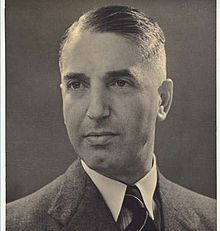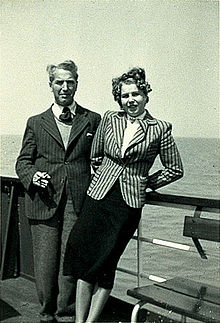- Fritz Pfeffer
-
Fritz Pfeffer 
Fritz Pfeffer, 1938Born Friedrich Pfeffer
30 April 1889
Gießen, GermanyDied 20 December 1944 (aged 55)
Neuengamme concentration camp, GermanyNationality German Education medical Occupation Dentist Known for The Diary of a Young Girl by Anne Frank Home town Giessen, Germany Religion Jewish Spouse Vera Bythiner, Charlotte Kaletta (married posthumously in 1953) Children Werner Peter Pfeffer Parents Ignatz Pfeffer and Jeannette Hirsch-Pfeffer Friedrich "Fritz" Pfeffer (30 April 1889 – 20 December 1944) was a German dentist and Jewish refugee who hid with Anne Frank during the Nazi Occupation of the Netherlands, and who perished in the Neuengamme concentration camp in Northern Germany. In Anne Frank's posthumously published diary, all names, apart from those of the Frank family, were changed to preserve the privacy of individuals mentioned. Pfeffer was given the pseudonym Albert Dussel.
Contents
Early life
Fritz was born in Gießen, Germany, one of the five children of Ignatz Pfeffer and Jeannette Hirsch-Pfeffer, who lived above their clothing and textiles shop at 6 Marktplatz in Giessen. After completing his education, Fritz trained as a dentist and jaw surgeon, obtained a license to practice in 1911 and opened a surgery the following year in Berlin.
He served in the German Army during the First World War and afterwards, in 1921 married Vera Bythiner (31 March 1904 – 30 September 1942), who was born in Posen in Imperial Germany (now Poznań, Poland). The marriage produced a son, Werner Peter Pfeffer (3 April 1927 – 14 February 1995), then the couple divorced in 1932. Fritz was granted custody of the boy and raised him alone until November 1938, when the rising tide of Nazi activity in Germany persuaded him to send him into the care of his brother Ernst in England. Werner emigrated to California in 1945 after his uncle's death and changed his name to Peter Pepper, later establishing a successful office supplies company under that name.
The tide of antisemitism in Germany, which increased from the election of Adolf Hitler in 1933, forced most of Fritz's relatives to flee the country. His mother had died in 1925; his father remarried and remained in Germany, only to be arrested; he died in Theresienstadt in October 1942. His elder brother Julius Pfeffer had died in 1928, Emil Pfeffer emigrated to South Africa in 1937, Ernst Pfeffer moved to England and died in 1944, and Hans left for New Jersey. Their sister Minna remained with their father in Germany and died in Nazi custody. Vera escaped to Holland but was arrested in 1942 and died in Auschwitz.
In 1936 he met a young woman Charlotta Kaletta (1910 – 1985), born in Ilmenau, Thuringia in Central Germany, who shared his history of a broken marriage. She was estranged from her first husband, Ludwig Lowenstein, and their son Gustaf. Neither survived the war. (Photos of Ludwig Lowenstein and his son, Gustav, can be found on the Yad Vashem website.) The couple moved in together but were prohibited from marrying under the 1935 Nazi Nuremberg Laws which forbade marriages between Jews and non-Jews.
Kristallnacht cemented their decision to leave Berlin and they fled to Amsterdam in December 1938. They were there for two years before the German invasion, and subsequent anti-Jewish laws which did not permit the co-habitation of Jews and non-Jews, forced them to officially separate and register under different addresses. After establishing a dental practice in Amsterdam's Rivierenbuurt he became acquainted with the Van Pels and Frank families. Miep Gies met Pfeffer at one of the Franks' house parties and became a patient in his dental practice.
In hiding and afterwards
In the autumn of 1942, he decided to go into hiding and inquired with Miep Gies about suitable addresses. She consulted Otto Frank, who, with his and the van Pels family, was being hidden by her in secret rooms in the Franks' office building. Frank agreed to accommodate Pfeffer and he was taken into their hiding place on 16 November, where his medical degree came in handy as they could not contact a doctor while in hiding.
Margot Frank moved into a room with her parents, to allow Pfeffer to share a small room with Anne, beginning what would become a torturous relationship for both. It has been suggested by at least one biographer that Anne's extreme discomfort at sharing her room with a middle aged man while she was going through puberty may have been at the root of her problems with Pfeffer but the pressures of being in hiding and the generational differences of the forty year age gap between them undoubtedly exacerbated the differences in their natures. Pfeffer felt his age gave him seniority over Anne and wrote off her writing activities as unimportant compared to his own studies. His observance of orthodox Judaism clashed with her liberal views; her energy and capriciousness grated on his nerves, while his pedantry and rigidity frustrated her. Anne's irritations and growing dislike of Pfeffer led to complaints and derisory descriptions of him in her diary, against which his son Werner and wife Charlotta defended him once the book was published.
Pfeffer left a farewell note to Charlotta and they stayed in touch through Miep, who met her on a weekly basis to exchange their letters and take provisions from her. His letters never disclosed the location of his hiding place and Miep never revealed it, but on 4 August 1944 Pfeffer and the seven other occupants of the hiding place were anonymously betrayed and arrested for deportation to Nazi concentration camps.
With the rest of the group and two of their protectors, Johannes Kleiman and Victor Kugler, Pfeffer was taken to the Nazi headquarters in Amsterdam-South, then to a prison for three days before being transported to Westerbork on 8 August. Pfeffer was taken to the Punishment Barracks with the others, where he undertook hard labour, until he was selected for deportation to Auschwitz on 3 September. He was separated from the others on arrival on 6 September and sent to the men's barracks, where he was reunited with Otto Frank. On 29 October he was transferred with 59 other medics to Sachsenhausen and from there to Neuengamme on an unknown date, where he died of according to the camp's records, enterocolitis, in the sick barracks on 20 December 1944 at the age of 55.
Posthumous reputation
According to the research done by Melissa Müller for her book Anne Frank - The Biography, Charlotta married Pfeffer posthumously in 1950, with retrospective effect to 31 May 1937. She had become estranged from his son Werner but both were united in their defense of Pfeffer after the publication of Anne Frank's diary in 1947, feeling that Anne's portrait of him—and of the pseudonym she had chosen for him, Mr. Dussel, which in German is "Mr. Nitwit"—was injurious to his memory. Otto Frank tried to placate them by reminding them of Anne's youth and of the unflattering portraits of some of the other people in hiding. The subsequent exaggerations of this portrait in the 1955 play and 1959 movie (in which he was played by comic actor Ed Wynn) led Charlotta to contact the screenwriters Albert Hackett and his wife Frances Goodrich to complain that they were libelling her deceased husband, who was depicted as ignorant about Jewish traditions. The Hacketts replied that their script did not mirror reality and that to inform a non-Jewish audience of the significance of Judaic ceremonies one character had to be ignorant of them. Charlotta pointed out that her husband was far from unbelieving and a master of Hebrew, but the character of "Mr. Dussel" remained unchanged.
Embittered by the unrepresentative portrait, she severed her links with Otto Frank and Miep Gies as Anne's fame grew in the decades after the war, and refused requests to be interviewed about her memories of him.
Werner remained in touch with Otto and had the opportunity to meet Miep shortly before he died of cancer in 1995, to thank her for her attempt to save his father's life. The meeting between Miep and Werner was recorded for the documentary film Anne Frank Remembered.[1]
A collection of letters written by Pfeffer to Charlotta and a box of photographs of him were rescued with some of Charlotta's possessions from an Amsterdam flea market after her death in 1985.
See also
References
Sources and further reading
- The Diary of a Young Girl: The Definitive Edition, Anne Frank, translated by Susan Massotty, edited by Otto H. Frank and Mirjam Pressler, Anchor Books, 1995.
- The Roommate of Anne Frank, Nanda van der Zee, Aspekt, 2003.
- The Footsteps of Anne Frank, Ernst Schnabel, Pan, 1959.
- Anne Frank Remembered, Miep Gies and Alison Leslie Gold, Simon and Schuster, 1988.
- Anne Frank: Reflections on her Life and Legacy, edited by Hyman A. Enzer and Sandra Solotaroff-Enzer, University of Illinois, 2000.
- Roses from the Earth, Carol Ann Lee, Penguin, 1999.
- Anne Frank - The Biography, Melissa Müller, Metropolitan Books, 1998.
External links
- Profile of Fritz Pfeffer with links to photographs
- Biography of Fritz Pfeffer by The Anne Frank House
- Article about the relationship between Anne Frank and Fritz Pfeffer
In hiding - Otto Frank
- Edith Frank
- Margot Frank
- Anne Frank
- Hermann van Pels
- Auguste van Pels
- Peter van Pels
- Fritz Pfeffer
Helpers - Jan Gies
- Miep Gies
- Victor Kugler
- Johannes Kleiman
- Bep Voskuijl
- Johannes Hendrik Voskuijl
Categories:- 1889 births
- 1944 deaths
- People relating to Anne Frank
- German military personnel of World War I
- German physicians
- People from Giessen
- German refugees
- Jewish refugees
- Neuengamme concentration camp victims
- German expatriates in the Netherlands
- Physicians who died in Nazi concentration camps
- German civilians killed in World War II
Wikimedia Foundation. 2010.

